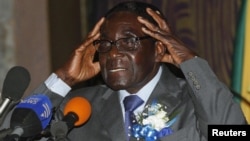HARARE, ZIMBABWE —
The International Monetary Fund says it has relaxed restrictions on technical assistance to Zimbabwe. Analysts say the Tuesday announcement, though, does not mean the southern African nation can access loans.
In a telephone interview, Zimbabwe Finance Minister Tendai Biti said the government is still analyzing the IMF announcement that it had relaxed restrictions on technical assistance to the country.
But analyst John Robertson from Robertson Economic Information Services said Zimbabwe is still far from qualifying for IMF financial support.
"The government has been crying for money and this is not money. This is advice. If we follow the advice we may qualify for financial assistance. The government has been hoping that we will simply get assistance," said Robertson.
Among polices that Robertson said Zimbabwe needed to do away with is "indigenization," which targets foreign-owned companies and gives them to black Zimbabweans. He added that Zimbabwe’s $10-billion foreign debt also stood in the way of the country getting IMF or World Bank funds.
In September, the IMF raised concerns over the failure by Sudan, Somalia and Zimbabwe to honor their commitments to pay their financial debts.
Before the IMF executive board announcement Tuesday, Finance Minister Biti was hopeful the institution would be lenient concerning the African country’s debt.
“We believe that our macro-economic fundamentals are sound, and that there is no reason at all why a positive decision would not be made in our favor," said Biti. "The importance of that IMF decision is that it will enable us to deal with the key issues of arrears that are the hindrance, [as] are sanctions, against Zimbabwe accessing huge levels of capital finance at the World Bank and the African Development [Bank].”
In its statement, the IMF executive noted “significant improvement in Zimbabwe’s cooperation on economic policies” and its “renewed commitment to address its arrears problems.”
Zimbabwe’s agricultural-based economy took a nosedive in early 2000 when the country embarked on a chaotic and violent land-reform exercise targeting white commercial farmers, seizing their farms, and replacing many of them with peasant farmers.
After a decade of decline, the economy has improved somewhat since the creation of a unity government in 2009. But that has been affected by indigenization policy.
“[It is] these same policy decisions that have put the country into financial difficult," said Robertson.
With elections expected next year in Zimbabwe, it might be difficult for President Robert Mugabe’s party to change its land ownership policies, which it says attracts voters.
In a telephone interview, Zimbabwe Finance Minister Tendai Biti said the government is still analyzing the IMF announcement that it had relaxed restrictions on technical assistance to the country.
But analyst John Robertson from Robertson Economic Information Services said Zimbabwe is still far from qualifying for IMF financial support.
"The government has been crying for money and this is not money. This is advice. If we follow the advice we may qualify for financial assistance. The government has been hoping that we will simply get assistance," said Robertson.
Among polices that Robertson said Zimbabwe needed to do away with is "indigenization," which targets foreign-owned companies and gives them to black Zimbabweans. He added that Zimbabwe’s $10-billion foreign debt also stood in the way of the country getting IMF or World Bank funds.
In September, the IMF raised concerns over the failure by Sudan, Somalia and Zimbabwe to honor their commitments to pay their financial debts.
Before the IMF executive board announcement Tuesday, Finance Minister Biti was hopeful the institution would be lenient concerning the African country’s debt.
“We believe that our macro-economic fundamentals are sound, and that there is no reason at all why a positive decision would not be made in our favor," said Biti. "The importance of that IMF decision is that it will enable us to deal with the key issues of arrears that are the hindrance, [as] are sanctions, against Zimbabwe accessing huge levels of capital finance at the World Bank and the African Development [Bank].”
In its statement, the IMF executive noted “significant improvement in Zimbabwe’s cooperation on economic policies” and its “renewed commitment to address its arrears problems.”
Zimbabwe’s agricultural-based economy took a nosedive in early 2000 when the country embarked on a chaotic and violent land-reform exercise targeting white commercial farmers, seizing their farms, and replacing many of them with peasant farmers.
After a decade of decline, the economy has improved somewhat since the creation of a unity government in 2009. But that has been affected by indigenization policy.
“[It is] these same policy decisions that have put the country into financial difficult," said Robertson.
With elections expected next year in Zimbabwe, it might be difficult for President Robert Mugabe’s party to change its land ownership policies, which it says attracts voters.




